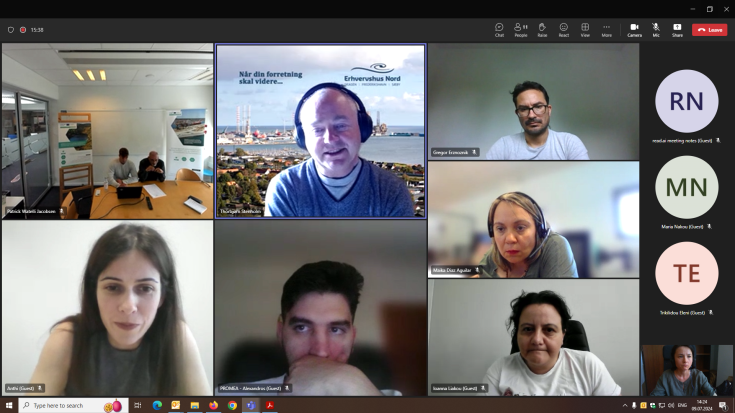Virtual Meeting on Risk Mitigation Measures

On Tuesday, July 9th, RAW4RES partners convened for a virtual scenario-building exercise as part of activity A1.4: Documentation and exchange of risk mitigation measures for reducing dependencies on critical raw materials (CRMs) and industrial metals.
The virtual session, organized by our Danish partner FHN, began with an introduction to CRMs and their importance in the context of regional dependencies and global supply chain disruptions. Denmark’s offshore wind power development was used to highlight the significance of several CRMs. The discussion focused on how supply chains have been disrupted during the COVID-19 crisis, the Ukraine war, and the Suez Canal blockade, all of which have threatened wind power development.
Following the introduction, participants were divided into two groups of five. Each partner was asked to complete three questionnaires:
- Identifying critical raw materials and metals of strategic importance
- Identifying sectors and economic activities most vulnerable to potential supply disruptions
- Identifying CRM supply challenges and risks
After completing the questionnaires, each group discussed their results, revealing mutual areas of common interest. The key takeaway was that green energy is a cornerstone of the green transition, and a steady supply of CRMs is crucial for producing green energy. The geographical concentration of CRM production and the EU's import dependency were identified as the most significant supply risks, followed closely by rapid demand growth, geopolitical tensions, and limited domestic resources.
The two groups then reconvened to collaboratively brainstorm potential mitigation measures for at-risk territorial activities under potential scarcity and disruption events. The discussion revealed that improving the local supply of CRMs by enhancing existing mines and reopening new mines was not considered a realistic option, mainly due to environmental regulations, legal concerns, local resistance, and economic reasons. It was suggested that closed mines could be repurposed as communal cultural centers.
Diversifying supply chains, investing further in R&D, and developing substitutions were deemed critically important. Another key takeaway was the importance of recycling and remining. Identifying CRMs already present in waste streams and extracting them was seen as an area with great potential, and participants expressed a desire to further elaborate on strategies used in different regions.
FHN will deliver a report analysing the territorial evidence collected, juxtaposing it with the mitigation strategies, elaborating on how the policy instruments addressed can integrate emergency funding and risk management provisions to address potential disruptions, and modify criteria in future calls for business support to promote supply diversification in project territories.
Epilogue by FHN
Europe's position in ensuring the security of supply of critical raw materials is currently insufficient and requires greater political attention. This attention must begin within all RAW4RES project partners' territories and then be extended at national and European levels. Emphasizing the significant potential of recycling waste streams to extract CRMs is crucial. A coordinated political effort is necessary to support and promote recycling as a viable option to mitigate the EU's dependence on critical raw materials.
